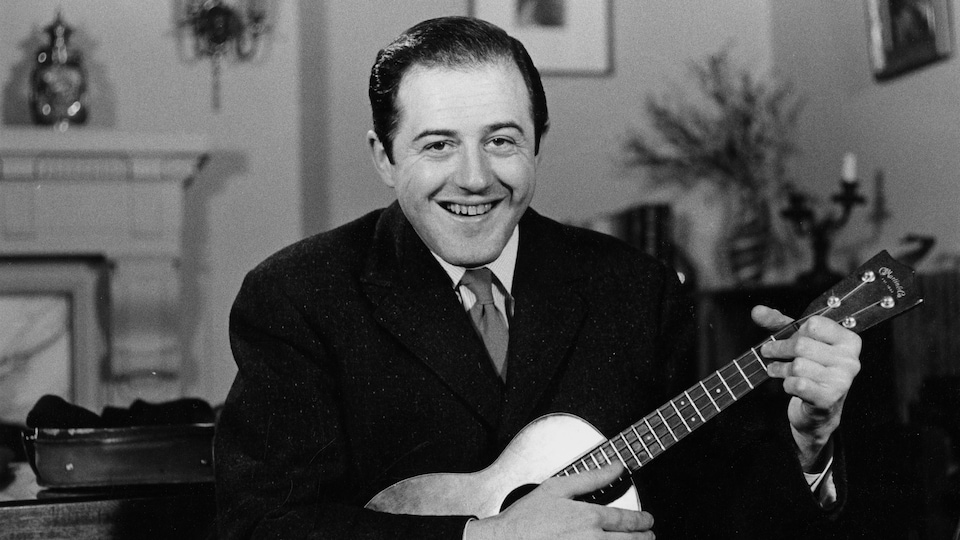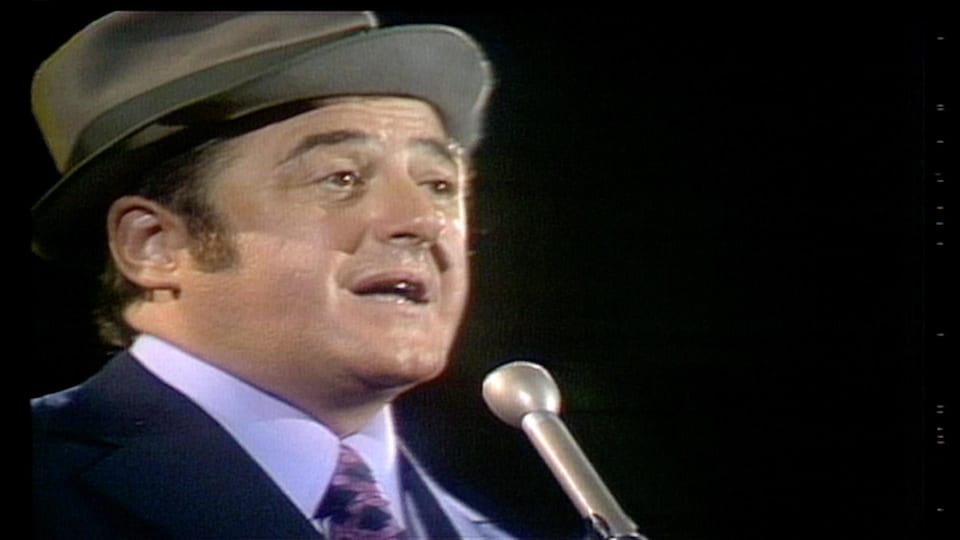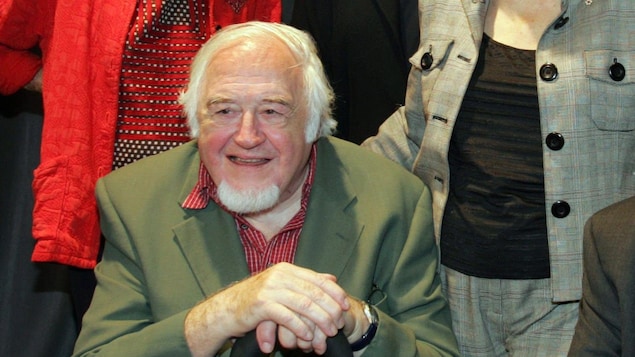He would have died after contracting COVID-19, his family has confirmed to many Quebec media.
Author, composer, performer, monologist, actor, co-founder of one of the first songboxes in Quebec, but also playwright, poet, polemicist and storyteller in his spare time, Raymond Lévesque has participated for nearly 50 years in Quebec cultural life. , but also to its independence march.
With Félix Leclerc, Gilles Vigneault and Claude Léveillé, he is part of this first version of Quebec singer-songwriters who have shaped the imagination of several generations, and who have also been successful in the Francophonie.
Sidewalks, Bozo the panties – his songs have been interpreted by the greatest of the Francophonie, from Barbara to Pauline Julien via Cora Vaucaire, Eddie Constantine, Vigneault, Leclerc, Robert Charlebois, not to mention “younger” like Luce Dufault or Marie-Pierre Arthur .
Raymond Lévesque in 1981.
Photo: Radio-Canada / Jean-Pierre Karsenty
—
Having become deaf in the mid-1980s, he then devoted himself exclusively to writing. He has published some fifteen books, including seven collections of poems, two plays and two stories, always imbued with humanism, social conscience, but often wet with a scathing humor.
In 2005, 10 years after the second referendum on Quebec sovereignty, he refused, for political and ideological reasons, the Governor General’s Prize for the Performing Arts, endowed with a $ 15,000 grant. A campaign organized by the Bloc Québécois then succeeded in raising more than double this amount, to give it to this champion of the independence of Quebec.
First Paris
Born in Montreal on October 7, 1928, Raymond Lévesque began his career at the end of World War II thanks to the singer Fernand Robidoux, very popular at the time, who performed his first creations. Robidoux will push the young songwriter to also become a performer, but it is through the theater that he will make his debut on stage – in Zone, by Marcel Dubé, in 1953.
In 1954, Raymond Lévesque, like many “French-Canadian” artists of that time, Félix and Léveillé in particular, moved to Paris because here, French-language songs necessarily passed through France – Félix s he first made a name for himself in Paris. Fashion was with French stars, even silly ones, who were welcomed here with open arms
, Raymond Lévesque recalled in 1999.
With little luck, he will roam five years in the clubs of Saint-Germain-des-Prés, alongside the Brels, Béart, Barbara, Ferrat, Perret … But unlike Félix, I had no agent and not a cent in my pockets – I had it all!
, he recalls again.

Singer Raymond Lévesque is one of the Quebec artists who had success in France in the 1950s.
Photo: Radio-Canada / André Le Coz
—
In 1955, he met the record producer Eddie Barclay, who helped him record his first LPs, then Eddie Constantine, who had become his friend, who would perform, with his crazy accent, several of his songs, including Sidewalks. But also, of course, When men live on love, written against the backdrop of the Algerian war and police brutality to which the Maghreb immigrants in Paris were victims – the sinister “ratonnades”.
It was during this first stay in Paris that Raymond Lévesque wrote for Dominique Michel, also unloaded under the Eiffel Tower, The Little Canadian, a song “à la Trenet”, which he admired. “Dodo” will also perform several songs by his compatriot, in Paris and in cabarets in Quebec – notably Sidewalks.
Raymond Lévesque will return to the country for a tour, in 1957, then a teletheatre in 1958 – Medea, still from Dubé -, before returning to Paris, where he will tour the music halls with Annie Cordy.
The Quiet Revolution
When he returned to Quebec in 1959, he found a company at the dawn of effervescence: the manifesto of Global refusal had been published in 1948, the “cheuf” Maurice Duplessis died, and Jean Lesage’s Liberals were elected in 1960. The Quiet Revolution was on its way, and Raymond Lévesque arrived at the right time. But the directors’ strike at Radio-Canada left him on the sidelines, and the end of the month was difficult.
With Clémence Desrochers, Claude Léveillé, Jean-Pierre Ferland and Hervé Bousseau, in 1959 he founded the songbox “Les Bozos”, which will make many children in Quebec. He also wrote at this time another of his successes, Bozo the panties, first sung by Pauline Julien.
Throughout the 1960s and 1970s, Raymond Lévesque lugged his song around from box to box, under fishing nets and lobster pots, and suddenly added scathing, nationalist and socialist monologues, news reviews. I was an independentist long before René Lévesque was one, and I was not shy about saying it
, he will say proudly.
In 1967, when the Front de liberation du Québec blew up letterboxes, Raymond Lévesque told Bozo the panties the awakening of a French Canadian, deceived by his elite and his clergy
, who realizes his enslavement and who blows up a monument in memory of the conquerors
. Pauline Julien, who sang Bozo the panties, will be arrested during the roundup of the War Measures Act in October 1970.
In an interview later, Raymond Lévesque, a great pacifist, explained that he wanted to pay tribute to these little guys
who had been driven by the events to commit violent acts.

Raymond Lévesque singing “Bozo les culottes”.
Photo: Radio-Canada
—
Withdrawn from the music scene in 1977, with the record The P’tit Quebec of my heart, the sovereignist resumed service during the referendum campaign of 1980, with a tour entitled “We want to know”.
More than 20 years later, in 1999, a two-disc box set did little justice to its vast repertoire. More recently, in 2016, artists, young and old, performed his songs and monologues on the album Hats off to Monsieur Lévesque!. But the poet was no business: his songs, poorly protected, fell into the public domain and he never touched a penny from his other performers.
Deafness
Raymond Lévesque, shy but courageous, did not have the success that his talent announced at the start. In a documentary by Louis Fraser released in September 1998, he admitted that to sing in big rooms, you need a lot of poise, a lot of profession. After 50 years of this profession, I’m ready to do it, but now I’m old
.
Old … and deaf. A disaster for the singer, but not necessarily for the man.: it would even be a happiness in this world of tricks “,” text “:” Being deaf is not a misfortune when you know everything that is being said: it would even be a happiness in this world of tricks “}}” lang = “fr”>Being deaf is not a misfortune when you know everything that is being said: it would even be happiness in this world of tricks., he confided sarcastically to filmmaker Fraser.
Raymond Lévesque received the Félix for his body of work from his peers in 1980. He received the Denise-Pelletier prize for the performing arts from the Quebec government in 1997, and was made Chevalier de l’Ordre national of Quebec. He was later decorated with the Medal of Honor of the National Assembly of Quebec in 2012.
The City of Longueuil paid tribute to its illustrious citizen by giving his name to its largest public library in 2011. The same year, the City of Montreal dedicated a small mural to him near Notre-Dame-de-Guadalupe Church. , in the Hochelaga-Maisonneuve district.
–


